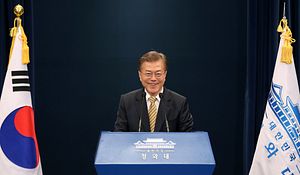The approval rating for South Korean President Moon Jae-in has reached its lowest point since his inauguration in May 2017. Aides at the Blue House see the dip as a “distress call” from the people for falling short on taking care of public welfare.
According to the polls, Moon’s approval ratings fell by 5.2 percent from last week to reach as low at 58 percent.
A Blue House official stated that the government wasn’t quick enough to respond to certain public issues, which could have influenced the polls.
In particular, the billing system for household electricity has become a critical issue in South Korea. The country has been suffering from record-high summer heat for the past two months, bombing households with excessive air conditioning bills.
Im Jong-seok, Chief Presidential Secretary, reportedly told his staff to determine “whether the government responded appropriately to the issues surrounding public welfare.”
Kim Eui-kyeom, a Blue House spokesperson said at a press briefing that while these discussions were “not based on the polls,” it served as an opportunity to “look back on the responsiveness of the government on issues such as the electricity billing.”
Alongside with the heat wave billing issue, the government has been subject to criticism for not being “strong enough” in tackling the BMW issue. The German automobile manufacturer was responsible for about 30 vehicles that caught on fire this year in South Korea due to faulty parts.
Spokesperson Kim was asked whether President Moon’s intention to allow large conglomerates (like the Chaebol) to buy more shares of internet banks has negatively affected his supporters. He said there are no “direct causal links.”
Moon’s plan to revise regulations that had limited large conglomerates to purchasing no more than 4 percent of a bank’s shares has been criticized by progressives who describe it as “a step backward from overhauling the Chaebol-dominant system. Spokesperson Kim said that it is to be limited to “direct banks” only, as a “safety measure.”
Asked about a recent report in U,S, media that U.S. Secretary of State Mike Pompeo told North Korea to cut its nuclear arsenal by 60 to 70 percent, spokesperson Kim said that the Blue House does not hold a particular stance on the matter.

































